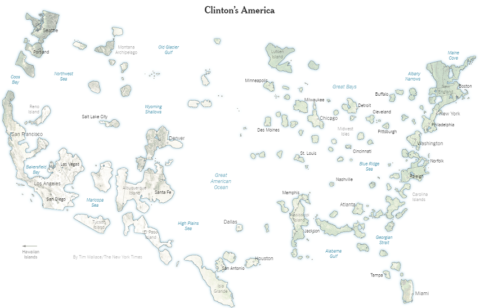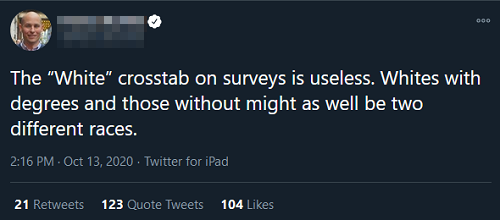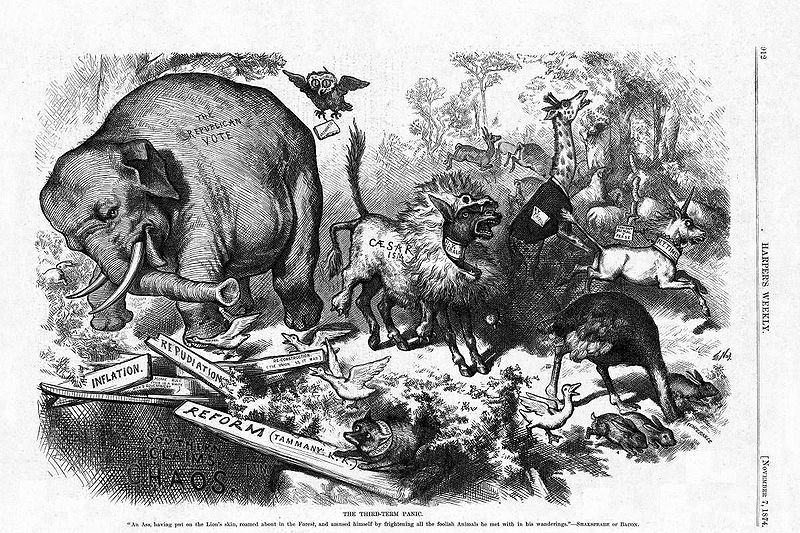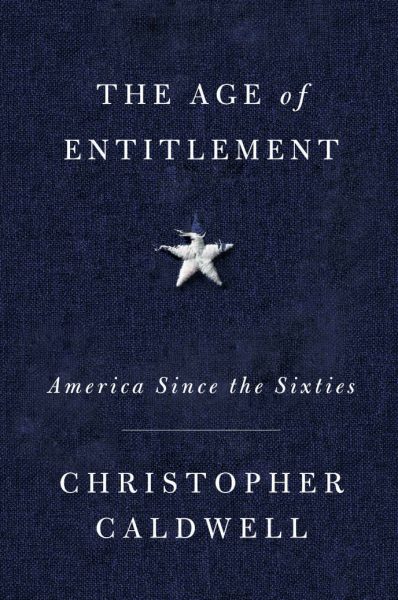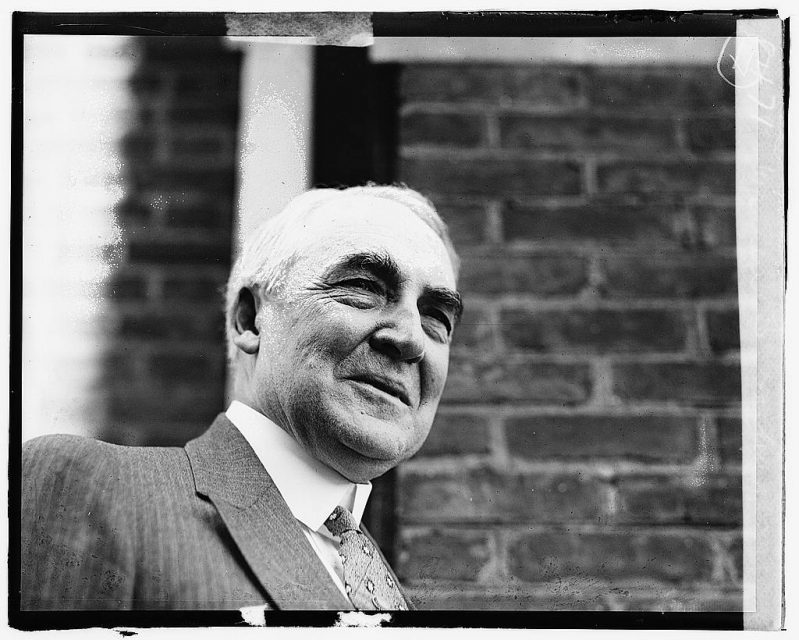Yes, false conspiracy theories are dangerous. One of the best defences a polity has against them is a reasonable level of trust in the authorities and the media. In the long run the only way to gain this trust is to be worthy of it, i.e. not to lie and not to hide the truth. By their promiscuous propagation of any story, however baseless, that might harm the Republicans and their enthusiastic censorship of any story, however credible, that might make the Democrats look bad, the American Woke Media, old and new, have lost this trust. As a result reality ensues, to quote TV Tropes. Or if you prefer the same truth in an older format, take your quote from William Caxton’s summary at the end of his retelling of the fable of the boy who cried wolf, “men bileve not lyghtly hym whiche is knowen for a lyer“.
Natalie Solent, “Why do Americans think the media might be hiding things from them? Let’s try asking Tony Bobulinski on Twitter”, Samizdata, 2021-01-13.
May 1, 2021
QotD: “WOLF! Film at 11”
March 10, 2021
How wide is the gap between extreme partisanship and sectarian violence?
Sarah Hoyt says she really didn’t want to write this post, and I completely understand why she feels that way:
The next American Civil War will be fought in a lot of places, in sudden flare ups and unexpected bursts of rage. But where most casualties will occur is in the home.
America’s civil war will be fougnt many places, but mostly in living rooms: siblings against each other, parents against children, children against parents, husband against wife, wife against husband.
If you live with a convinced leftist, how safe is your life, should the balloon go up?
And before you say “The first civil war was also between brothers!”
Sure, it was. There were mixed families. Mostly upper crust mixed families. But the war was largely a regional war, the country riven on regional lines.
Now? Bah. Now it’s a war of ideology. A war of beliefs.
And a lot of people are sleeping with the enemy, hanging out on weekends with the enemy. Visiting the enemy. Having lunch with the enemy.
At this moment a lot of you are sitting back there and going “My wife/husband/elementary school friend is not an enemy. Sure, he/she/it drank the Marxist koolaid from a hose but in every day life, in our normal interactions, in non-political things, we are very close, the best of friends.”
And maybe you are. Maybe you can trust them with your life.
But I will remind you we live in a nation where the capital is surrounded with razor wire to defend themselves from people who voted for the guy. I will remind you there are troops occupying our capital and that our secret services have so far been corrupted they keep inventing internet conspiracies (or probably referring to their very own black ops) to justify it.
I will remind you that your favorite progressive has allowed himself to be moved from “strong welfare net” to “we need full on communism, with favored races” within the last 12 years (or was indoctrinated into that state in schools.) I will remind you — and the conversations related back to me don’t help me think otherwise — that your favorite leftist thinks you’re racist/homophobic/evil. NO MATTER HOW MANY indications to the contrary.
And I can hear you sniffling: “But I love him/her/it/fuzzy.” Well, yes, and ten years ago that would have been me. I had very good friends I just classed as political idiots. I don’t wish the last 10 years on anyone, but at least they’re not living with me, 90% of them don’t know where I live. And I’ll be out of here in hopefully no more than 4 but maybe ten months, and maybe we have that long. Also, most of my close friends/acquaintances aren’t likely to cause any damage, being … not the type. On the other hand two dozen of them (easy) are friends with people who WILL.
Now to be clear: do I expect all of you in mixed political families to be in danger?
No. Any number of your spouses, relatives and friends are leftist because that’s “what good people are.” And they will turn on a dime, too, if half the crap about what the left has been doing for the last couple of decades comes out unvarnished and unspun. (The left knows it too. They’re perhaps more scared of these people than they are of us.)
Others are leftist and might hate your guts if things go hot, but simply don’t have it in them to hurt anyone. These are the “slippery” ones, because if you had asked me, even two years ago, if the media and the left (BIRM) could spin these people into wishing death on someone for not wearing a mask, when the person is not sick; there’s no proof of asymptomatic transmission (there’s reports from China but NOWHERE ELSE); and the actual disease (it’s not hard to find) might be a little more lethal than the flu but only at ages past about 80, I’d have said “no. They’re politically insane, but not stupid.” However they are “group oriented.” Turns out the type of gaslighting we’ve been enduring works really well on people who live for others’ opinions. (Which explains whey Southern Europe is still mired in the fricking crazy. Uniformly. And why women in general are more susceptible to the completely irrational gaslighting than men.) And they already believe a bunch of crazy crap. The reason that they think QANON is right main stream, it’s because it’s the mirror image of their actual main stream.
Are you sure they’ll remain inoffensive if the ballon goes up and the gaslighting switches to “If you know a Trump voter, he/she is dangerous?” How about “Turn them in, so they can be sent somewhere nice for their own protection?”
Look, guys, I hope none of this is ever needed. I still have friends on the other side, I’m just not in touch and we work on the very long finger. And there are people I no longer consider friends but whom I like very much who are buying into the entire insane bull excreta of “attempted coup” and evil “white nationalists.”
But like Peter Grant, I think we’re way past the ballot box, and just waiting for a precipitating incident.
I desperately hope she’s wrong about this, because an actual shooting war in the United States would be a disaster for western civilization.
Update: It’s apparently time to Immanentize the Eschaton!
I’m of the firm opinion that the Progressive Left believed that once Obama won his second term they were set. The eschaton night not be immanent, but it was imminent. Hillary was going to be another “great leap forward” towards the heaven on Earth promised by Karl Marx. […]
“Politics” it is said, “is the art of compromise.” “War,” said von Clausewitz, “is politics by other means.” I have repeated and repeated the observation that has made itself manifest in the nearly 18 years I’ve been writing this blog: Charles Krauthammer noted in 2002 that “To understand the workings of American politics you have to understand this fundamental law: Conservatives think liberals are stupid. Liberals think conservatives are evil.”
You don’t debate with evil. You don’t negotiate with evil. You don’t compromise with evil. You don’t tolerate evil. You DESTROY evil. You pat it on the head until you can find a rock big enough to bash its skull in.
And control of the culture, education, and the government makes for a big damned rock.
Here’s the tinfoil yarmulke part of this essay: The preparations are underway. When debate and compromise are no longer possible, then force is the only thing left. They know it, and they’re projecting it on their enemy, us.
The Progressive Left has created and exercised its Sturmabteilung (yes, I know I risk Godwinization, and they loathe such comparisons, but this one’s apt. Their outfits are black instead of brown, but the actions are the same.) They’ve been set loose in the Pacific Northwest and some other cities and have been allowed to riot, commit arson, loot and occasionally murder with little to no legal consequence (violence, after all, being free speech you know.) Andy Ngo has studied Antifa, itself with roots in radical Socialism, in depth, and says that they are preparing for war, generously supported by the more mainstream Progressive Left. Black Lives Matter, an organization founded by two open Marxists, is also part of the preparations, but these are in my opinion just the Progressive Left’s “useful idiot” shock troops – the first to go against the wall after the Revolution.
March 1, 2021
In the 2020 US federal election, “Each side felt that the stakes were existential”
Michael Anton discusses what he calls the “Continuing Crisis” in the Claremont Review of Books:
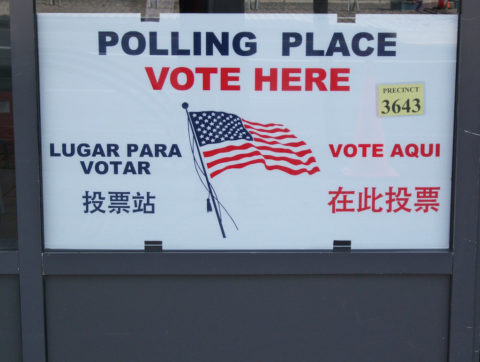
“Polling Place Vote Here” by Scott Beale is licensed under CC BY-NC-ND 2.0
A full understanding of what happened that Wednesday would begin with the ruling class’s decades-long betrayal and despoliation of what would eventually come to be called Red or Deplorable or Flyover America. But the more proximate cause was the 2020 election — easily the highest intensity such contest of my lifetime. Each side felt that the stakes were existential. The accuracy of those feelings doesn’t matter; their existence was enough to drive events.
As an incumbent seeking a second term, President Trump — even after the COVID lockdowns had tanked America’s previously supercharged economy — seemed to have a lot of things going for him: near-unanimous support from the base, high primary turnout even though he faced no opposition, a seemingly unified party, approval ratings not far from Barack Obama’s in 2012. According to Gallup, in September 2020 56% of Americans reported doing better than they had four years prior — a level that, in ordinary times, would all but guarantee an incumbent’s re-election.
But these were not ordinary times. It was also easy to see — and many friends and supporters of the president did see, and warned about — shoals ahead. The Democrats used the pandemic as an excuse to accelerate and intensify their decades-long effort to loosen and change American election practices in ways that favor their party. In the spring, they began openly talking about staging a coup: literally using the military to yank Trump from power. It’s one thing to hold a “war game” and plot in secret about a president’s ouster, but why leak the result? Only if you want the public prepared for what otherwise would look like outrageous interference in “our democracy.” Democrats and their media allies also, and for the same reason, assiduously pushed the so-called “Red Mirage” narrative: the story that, while you are likely to see Trump way ahead on election night, he will certainly lose as all the votes are counted. This was less a prediction than preemptive explanation: what you see might look funny, but let us assure you in advance that it’s all on the up-and-up.
In response (or lack thereof) to the other side’s assiduous preparations, the president, his staff, his campaign, and his party committed four serious errors of omission. First, they made hardly any attempt to work with Republican state officials — governors, legislatures, and secretaries of state — to oppose and amend rule changes that would disadvantage them and favor their opponents. As far back as the 2016 election, Trump had complained that Hillary Clinton’s popular vote total had been padded by several million votes by illegal immigrants. Yet he and the GOP did very little to tighten state election procedures. Second, after having failed adequately to oppose those changes, they mounted far too few legal challenges to get them overturned or modified. Third, having declined to challenge the changes, they barely even tried to ramp up their own mail-in voting operation to rival the Democrats’. Fourth, despite numerous loud predictions — both as boasts and warnings — that the election outcome would be unclear and disputed in several states, no team was assembled in advance to investigate and, if necessary, litigate the results. Florida 2000 came as a surprise to candidates Al Gore and George W. Bush. Nonetheless the Bush campaign was able to field almost immediately an army of lawyers, including experts on election law, headed by a former secretary of state, the wily James Baker. The Trump team had at least six months’ warning and, as far as I can see, did nothing to prepare.
H/T to “currencylad” at Catallaxy Files for the link.
February 28, 2021
Should the Republicans embrace “class warfare”?
Scott Alexander proffers some advice to the US Republican Party in its post-Trump doldrums, even though he admits that “I hate you and you hate me. But maybe I would hate you less if you didn’t suck. Also, the more confused you are, the more you flail around sabotaging everything.”
So here’s my recommendation: use the word “class”. Pivot from mindless populist rage to a thoughtful campaign to fight classism.
Yeah, yeah, “class” sounds Marxist, class warfare and all that, you’re supposed to be against that kind of thing, right? Wrong. Economic class warfare is Marxist, but here in the US class isn’t a purely economic concept. Class is also about culture. You’re already doing class warfare, you’re just doing it blindly and confusedly. Instead, do it openly, while using the words “class” and “classism”.
Trump didn’t win on a platform of capitalism and liberty and whatever. He won on a platform of being anti-establishment. But which establishment? Not rich people. Trump is rich, lots of his Cabinet picks were rich, practically the first thing he did was cut taxes on the rich. Some people thought that contradicted his anti-establishment message, but those people were wrong. Powerful people? Getting warmer, but Mike Pence is a powerful person and Trump wasn’t against Mike Pence. Smart people? Now you’re burning hot.
Trump stood against the upper class. He might define them as: people who live in nice apartments in Manhattan or SF or DC and laugh under their breath if anybody comes from Akron or Tampa. Who eat Thai food and Ethiopian food and anything fusion, think they would gain 200 lbs if they ever stepped in a McDonalds, and won’t even speak the name Chick-Fil-A. Who usually go to Ivy League colleges, though Amherst or Berkeley is acceptable if absolutely necessary. Who conspicuously love Broadway (especially Hamilton), LGBT, education, “expertise”, mass transit, and foreign anything. They conspicuously hate NASCAR, wrestling, football, “fast food”, SUVs, FOX, guns, the South, evangelicals, and reality TV. Who would never get married before age 25 and have cutesy pins about how cats are better than children. Who get jobs in journalism, academia, government, consulting, or anything else with no time-card where you never have to use your hands. Who all have exactly the same political and aesthetic opinions on everything, and think the noblest and most important task imaginable is to gatekeep information in ways that force everyone else to share those opinions too.
(full disclosure: I fit like 2/3 of these descriptors)
Aren’t I just describing well-off people? No. Teachers, social workers, grad students, and starving artists may be poor, but can still be upper-class. Pilots, plumbers, and lumber barons are well-off, but not upper-class. Donald Trump is a billionaire, but still recognizably not upper class. The upper class is a cultural phenomenon.
Aren’t I just describing Democrats? No. The Democrats are a coalition of the upper class, various poor minorities, union labor, and lots of other groups. It’s an easy mistake to make, because you Republicans absolutely loathe the upper class, and whenever you’re talking about Democrats you focus on this group and how much you hate them. But you make the mistake of saying you hate Democrats, and then it looks like boring old partisanship. Or saying you hate the elites, and then it looks like boring old populism. Or saying you hate rootless cosmopolitans, and then it looks like boring old anti-Semitism. Or saying you hate the government, and then it looks like boring old libertarianism.
Instead, just use the words “class” and “classism”. Say “Hey, we Republicans want to be the party of the working class. We are concerned about the rising power of the upper class, and we are dedicated to stamping out classism.”
February 10, 2021
“Did you know that seventy years ago, our grandparents were having an underpolarization crisis?”
Scott Alexander reviews Why We’re Polarized by Ezra Klein, beginning with the underpolarization crisis of the mid-20th century:
In 1950, the American Political Science Association “released a call to arms … pleading for a more polarized political system”. The report argued that “the parties contain too much diversity of opinion and work together too easily, leaving voters confused about who to vote for and why”. Everyone agreed with each other so much, and compromised so readily, that supporting one party over the other seemed almost pointless.
In 1976, three years after Roe v. Wade, Democrats and Republicans were about equally likely to support abortion restrictions. That same year, a poll found that “only 54% of the electorate believed that the Republican Party was more conservative than the Democratic Party”; 30% thought there was no difference. As late as 2004, about equal numbers (within 5 pp) of Democrats and Republicans agreed with statements like “government is almost always wasteful and inefficient” and “immigrants are a burden on our country”. Between the late 60s and early 90s, Democratic presidents deregulated the airlines and passed welfare reform; Republican presidents pushed immigration amnesties and founded the EPA.
What happened between then and now? Klein has two answers: a historical answer, and a structural answer.
The historical answer is: the Dixiecrats switched from Democrat to Republican.
When the North won the Civil War, it had grand plans to remake the South into a paradise of racial equality and universal love. After Lincoln’s death, his successor Andrew Johnson decided this sounded hard and gave up. Within a few decades, the South was back to being a racist, paramilitary-violence-prone one-party dictatorship. That one party called itself “Democrat”, but had few similiarites to the Democrats in the North. The Southern Democrats (“Dixiecrats”) and northern Democrats disagreed on lots of issues, but the South hated the Republicans so much after their experience with Lincoln that they caucused with the northern Democrats anyway. This turned into a stable coalition, with northern Democrats agreeing to support the South against civil rights for blacks, and the Dixiecrats supporting the northern Democrats whenever they needed something.
But since the Democratic party contained both northern Democrats (relatively liberal) and Dixiecrats (relatively conservative), it didn’t want to take a coherent party-wide stance on liberalism vs. conservatism. And by the median voter theorem, that meant the Republicans also didn’t want to take a coherent stance on liberalism vs. conservatism. So both parties ended out centrist and identical.
In 1964, the Civil Rights Act threatened the Dixiecrats’ key issue. It wasn’t quite as simple as “Democrats were for it, Republicans were against it” – in fact, 80% of Republicans and 60% of Democrats supported it. But that year’s presidential election pitted heavily pro-CRA Democrat Lyndon Johnson against anti-CRA Republican Barry Goldwater, beginning Southerners’ defection to the Republican Party.
Klein says this successfully got all the conservatives on one side of the aisle and all the liberals on the other, allowing polarization to begin. Essentially, he believes polarization is a natural process, which the odd coalitions of the early 20th century temporarily prevented. Once the coalitions were broken, it could begin to do its work. He spends the rest of the book talking about why exactly polarization is so natural, what aspects of modernization have made it worse, and what sort of feedback loops make it keep going
December 7, 2020
QotD: American politics as “the playoffs”
Like other Americans, however, many libertarians think of political parties like sports teams. They want their own team to root for and cannot root for the other teams. Voting Libertarian gives them psychological satisfaction, while in the aggregate diminishing their political impact.
Libertarians should stop thinking of parties as teams and think of them instead as the playoffs. In NFL football terms, The Democrats are the AFC and the Republicans the NFC. To get into the Superbowl, you have to survive the season and the playoffs in your respective conference. In effect, Libertarians want to form their own league which no one but themselves is interested in watching. And they assure themselves of never making the playoffs much less the Superbowl.
Randy Barnett, “Parties Are Not Sports Teams — Parties are the Playoffs”, The Volokh Conspiracy, 2005-02-24
November 12, 2020
The party of the Lucky Winners
Brian Micklethwait sends some thoughts from his sick-bed on the (still in question) outcome of the US election:

“Polling Place Vote Here” by Scott Beale is licensed under CC BY-NC-ND 2.0
Democrat electoral cheating is not a new story. I’ve been reading stuff about America and American politics all my life, off and on and mostly off, and like a thread through it all is the fact that in big cities that they run and are determined to go on running, Democrats cheat in elections. So Democrats cheating in elections this time around is not the big change.
The big change is a Republican refusing to retreat in the face of it. Why? Why is Trump being so unpresidential, so undignified, so … just so ghastly? The answer is that the big political picture has been transformed, partly by him, but partly by him responding to the fact that it has already changed so much.
Time was when Republicans were the party of the Lucky Winners. Country clubbers, corporate executives, yacht owners, owners of houses with several garages, presided over by perfectly manicured wives, in charge of several well behaved children and subservient servants. The Democrats, meanwhile, were the party of the workers, of people struggling to do work or even to get work. Any plutocrats who were attached to the Democrats, like the Kennedys or (FD) Roosevelt, were numerically insignificant oddities. (Whether that was true, I don’t know. But this was the dominant narrative, as people say now.)
But that’s all changed. The Democrats are now the party of the Lucky Winners, and also of the unlucky losers at the very bottom of the heap who can only now depend on the crumbs of comfort bestowed upon them by the Lucky Winner class. The Republicans have become the party of the workers in the middle, the middle class, as Americans accurately describe them. The Republicans are the party of the people who still struggle to work and to stay working, and who hate the whole idea of giving up and becoming dependant upon the Lucky Winners.
Not all “workers” voted for Trump. A lot of workers, especially in things like IT, are still solidly Democrat. But the heart of the Trump vote was workers of a certain sort. The heart of the Trump vote was no longer the Lucky Winners class. They have migrated over to the Democrats.
Okay, now for the key bit of what I’m saying.
In olden times, if you were a member of the Lucky Winners class, and your guy lost an election, complaining about cheating was frankly a bit, well, undignified. You and your pals controlled almost all the levers of power in society. You owned the big corporations. Your children were creaming off most of the expensive education. The world was yours. Were you going to bitch about electoral corner-cutting by a few machine politician Democrats in big cities who had enough clout to say boo to you, every once in a while? This was not a good look. And on the whole, Republicans took their defeats, and if Democrat cheating cost them a win or two, well, that was how it crumbled, cookie-wise. Legally, that may not have been the rule, but actually, that was the rule. Noblesse oblige. Let the people picked by the struggling class have their turn. Suck it up. Go play golf.
But now? Now, what is happening is that the Lucky Winners class is telling the class definitely below it in the pecking order that this subordinate class now has to just lie back and let it happen, when the electoral cheating happens all over them.
This is not a good look either, but it’s what the Lucky Winner class now think they can do, and get away with. Maybe they can, in the sense that they may well get their guy over the line this time around. But if they do, but if it then becomes clear that they did this by cheating on a large scale in this election, then the words “reap” and “whirlwind” spring to mind.
September 29, 2020
July 6, 2020
Time to end US military deployments to Afghanistan?
Brad Polumbo reports on the split between Republican voters and Republican Senators on ending the US military involvement in Afghanistan:
Applied to the Middle East, the America First framework is intuitive — our military misadventures in countries like Iraq, Libya, and Afghanistan have cost the U.S. tremendously yet failed to further our interests. Once the party of hawks and idealists, Republican voters are now firmly in the America First camp. According to The Intercept, 81% of 2016 Trump voters support removing troops from Afghanistan.
Unfortunately, this shift in views has not been represented in Congress. Most Senate Republicans just explicitly voted against ending the war in Afghanistan.
On Wednesday evening, Sen. Rand Paul, a libertarian-leaning Kentucky Republican, introduced an amendment to the National Defense Authorization Act that would have brought our troops home from Afghanistan, given those soldiers who served a bonus, and repealed the authorization of force Congress passed in 2001. But in a 60 to 33 vote, the Senate shot it down, with only three Republicans in addition to Paul — Sens. Mike Lee, Mike Braun, and Steve Daines — backing the amendment.
“Our amendment [would] finally and completely end the War in Afghanistan,” Paul said on the Senate floor. “Over 4,000 Americans have died in Afghanistan and over 20,000 have been wounded. It’s time to bring our soldiers home.”
“It is not sustainable to keep fighting in Afghanistan generation after generation,” he continued. “In fact, we now have soldiers who were born after 9/11 serving in Afghanistan.”
“We’ve been there for 20 years,” the senator said. “How can we characterize withdrawal after 20 years, after we defeated the enemy, as ‘precipitous’? It’s crazy. The American people say, ‘Come home,’ and this is your chance.”

“Afghanistan 2010 43” by david_axe is licensed under CC BY-NC 2.0
February 22, 2020
February 4, 2020
Andrew Sullivan – “Our fate was almost certainly cast as long ago as 1964 and 1965”
In his most recent New York magazine column, Andrew Sullivan reviews two new books on the same issues from different perspectives: Ezra Klein’s Why We’re Polarized and Christopher Caldwell’s The Age of Entitlement.
… both books agree on one central thing: Our fate was almost certainly cast as long ago as 1964 and 1965. Those years, in the wake of the Kennedy assassination, saw the Civil Rights Act upend the Constitution of a uniquely liberal country in order to tackle the legacy of slavery and racism, and the Immigration and Nationality Act set in motion the creation of a far more racially and ethnically diverse and integrated society than anyone in human history had previously thought possible. Still, at the time, few believed that either shift would have huge, deep consequences in the long term. They were merely a modernization of American ideals: inclusivity, expansiveness, hope.
As someone who was born just before these two changes were instigated, I regarded those tectonic shifts as simply part of the landscape — something that seemed always to have been here. And what could be questioned about either? One was reversing a profound moral evil; the other was banishing racism from the immigration laws. No-brainers. The strongest resistance to civil rights came from former segregationists or obvious racists, and there was little resistance to the Immigration Act, because most in the congressional debate seemed to think it wouldn’t change anything much at all. (The House sponsor of the Immigration Act, as Caldwell notes, promised that “quota immigration under the bill is likely to be more than 80 percent European,” while Ted Kennedy insisted: “The ethnic mix of this country will not be upset.”) There were a few dissenters to the 1964 Act, such as Robert Bork, who identified a significant erosion in the freedom of association. And there were southern senators who worried about immigrants from the developing world. But the resisters were easily dismissed on both counts, in the wake of LBJ’s 1964 landslide.
In fact, as Klein shows, a pivotal moment had arrived. The civil-rights movement quickly broke apart the old Democratic party, which had for decades combined the interests of blacks and southern whites into a single multiracial coalition. The result was a sorting of the two political parties into much purer vessels for their diverging ideologies, and into groupings that were also increasingly racially distinct. The GOP became whiter and whiter; the Democrats more and more became the party of the marginalized nonwhites as the years rolled by. Blacks and southern whites ceased to communicate directly within a single party, where compromises could be hammered out through internal wrangling. In the aggregate this was, as Klein emphasizes, a good thing — because blacks kept coming out the losers in those intraparty conversations, and with civil rights, they had a chance of winning in a clearer, less rigged, debate.
But it was also problematic because human beings are tribal, psychologically primed to recognize in-group and out-group before the frontal cortex gets a look-in. And so the whiter the GOP became, the whiter it got, and the more diverse the Democrats got. Simultaneously, the economy took a brutal toll on the very whites who were alienated by the culture’s shift toward racial equality, and then racial equity. Klein recognizes that this racial polarization, is, objectively, a problem for liberal democracy: “Our brains reflect deep evolutionary time, while our lives, for better and worse, are lived right now, in this moment.” So he can see the depth of the problem of tribalism — and its merging with partisanship, which goes on to create a megatribalism.
If humans simply cannot help their tribal instincts, then a truly multicultural democracy has a big challenge ahead of it. The emotions triggered are so primal, that conflict, rather than any form of common ground, can spiral into a grinding cold civil war. And you can’t legislate or educate this away. One fascinating study Klein quotes found that “priming white college students to think about the concept of white privilege led them to express more racial resentment in subsequent surveys.” Anti-racist indoctrination actually feeds racism. So tribalism deepens.
Klein sees this spiral more clearly than most on the left. He acknowledges the truth that in a period of extraordinary demographic and racial change — the U.S. is the first majority-white nation that will become majority nonwhite in human history — every group begins to feel like an oppressed minority. Including whites: “To the extent that it’s true that a loss of privilege feels like oppression, that feeling needs to be taken seriously, both because it’s real, and because, left to fester, it can be weaponized by demagogues and reactionaries.” And the truth is: It was left to fester. Whenever whites resisted ever-expanding concepts of civil rights or mass illegal and legal immigration, they were cast outside the arena of permissible disagreement, deemed racists, and stigmatized. Even the GOP scorned them. Eventually, Hillary Clinton named them: the deplorables. By 2016, plenty of Americans decided to embrace the label, and voted for Trump.
January 27, 2020
QotD: The radicalization of the Republican Party
When the Democrats ran the House of Representatives for almost all of six decades, before 1995, they did not treat the Republican minority particularly well. So I can understand Newt Gingrich’s desire for revenge when he took over as Speaker of the House in 1995. But many of the changes he made polarized the Congress, made bipartisan cooperation more difficult, and took us into a new era of outrage and conflict in Washington. One change stands out to me, speaking as a social psychologist: he changed the legislative calendar so that all business was done Tuesday through Thursday, and he encouraged his incoming freshmen not to move to the District. He did not want them to develop personal friendships with Democrats. He did not want their spouses to serve on the same charitable boards. But personal relationships among legislators and their families in Washington had long been a massive centripetal force. Gingrich deliberately weakened it.
And this all happened along with the rise of Fox News. Many political scientists have noted that Fox News and the right-wing media ecosystem had an effect on the Republican Party that is unlike anything that happened on the left. It rewards more extreme statements, more grandstanding, more outrage. Many people will point out that the media leans left overall, and that the Democrats did some polarizing things, too. Fair enough. But it is clear that Gingrich set out to create a more partisan, zero-sum Congress, and he succeeded. This more combative culture then filtered up to the Senate, and out to the rest of the Republican Party.
Jonathan Haidt, “The Age of Outrage: What the current political climate is doing to our country and our universities”, City Journal, 2017-12-17.
December 24, 2019
Remy: “The First Noel” (Ballot Access Parody)
ReasonTV
Published 23 Dec 2019Remy is creeped out by restrictive ballot access measures. Also by Prince Andrew.
——————
Follow us on Twitter: https://twitter.com/reason
Subscribe to our podcast at Apple Podcasts: https://goo.gl/az3a7aReason is the planet’s leading source of news, politics, and culture from a libertarian perspective. Go to reason.com for a point of view you won’t get from legacy media and old left-right opinion magazines.
—————-
Written and performed by Remy.
Produced and edited by Austin Bragg.
Music tracks and mastering by Ben Karlstrom.LYRICS:
The first Noel I heard early one day
As I tried to run as a new candidate
My cheeks were wetter than Prince Andrew’s shirt
When the man spoke to me and he told me these words:No “L,” no “L”
No “L,” no “L”
No room for me on the ballot, oh wellI looked up a party wherein
I could join but was told “There’s no room at the inn”
No bed to lay and I heard “take a hike”
Like the time I bought my wife an exercise bikeNo “L,” no “L”
No “L,” no “L”
No room for me in the parties, oh wellMy wish this year is to feel content
At the ballot and not—to be frank—incensed
Must it be so hard to boot folks we don’t like
But they claim it is lawful and I think that’s right, but …No “L,” no “L”
No “L,” no “L”
Seriously, how creepy is Prince Andrew?
December 10, 2019
In praise of Warren Gamaliel Harding
At Essays in Idleness, David Warren says nice things about an American president who rarely gets any love from historians:
Like most politicians, W. G. Harding was only semi-literate, yet well above the average. The Ivy League types are still querying his use of “normalcy,” which the Natted States president used during his election campaign of 1920. Harding himself ranks low in the polls of “Great American Presidents,” though he was quite popular until his death. That mistake, committed after a heart attack in San Francisco, anno 1923, was the first of several. It was discovered that his administration had been rather corrupt, and himself guilty of an adultery. One might say he was “impeached,” posthumously. Today, they impeach Republican presidents for breathing.
Warren Gamaliel Harding is naturally among my favourite presidents. This has something to do with his “return to normalcy.” For the better part of a decade, his countrymen had suffered under the ministrations of progressive Democrats, such as the unspeakable Woodrow Wilson, and from such foreign entanglements as the First World War. The federal budget was being blown to heck, and society was on the verge of the Jazz Age.
Harding, who stayed home in Marion, Ohio, for most of his presidential campaign — rather than “pressing the flesh” and risking the influenza — won by a landslide, promising: “Not heroics, but healing; … not revolution, but restoration; not agitation, but adjustment; not surgery, but serenity; not the dramatic, but the dispassionate; not experiment, but equipoise; not submergence in internationality, but sustainment in triumphant nationality.”
Oh yes and, “not nostrums, but normalcy.”
The quote, which I have filched from the Wicked Paedia, is semi-literate throughout. Harding was a man who had an unhealthy relationship with a dictionary, and to his other sins, we must add an addiction to semi-colons. Still, “The Peeple” could guess what he meant. He wanted America to move backwards. He thought the whole country should forget about recent lunatic adventures, and return to her wonted calm.
Al Stewart wrote a song called “Warren Harding” (lyrics here):
August 25, 2019
QotD: Bipartisan authoritarianism
Hey, remember how Bill Clinton doubled down on the War on Drugs, perfecting Reagan’s haphazard and shoddily made race-war into a well-oiled incarceration machine that turned America into the world’s greatest incarcerator, a nation that imprisoned black people at a rate that exceeded Apartheid-era South Africa?
Some Democrats want to double down on their party’s shameful Drug War history. Massachusetts Rep. Stephan Hay [D-Fitchfield] has introduced House Bill 1266, which treats the existence of “a hidden compartment” in a vehicle as “prima facie evidence that the conveyance was used intended for use in and for the business of unlawfully manufacturing, dispensing, or distributing controlled substances.”
This means that if a cop stops you and finds no drugs or other contraband, but decides that part of your car is a “hidden compartment,” that cop can subject your car to civil asset forfeiture — that is, they can steal it, and force you to sue them to get it back.
The role of the Democratic Party is often to take the Republicans’ stupidest, red-meat-for-the-base policies, sloppily designed and doomed to collapse under their own weight, and operationalize them, putting them on the kind of sound bureaucratic footing that they need to have real staying power. Exhibit A is the drug war, but see also Obama’s perfection of GWB’s mess of a mass-surveillance apparatus, turning it into an immortal and pluripotent weapon that Donald Trump now gets to wield.
Cory Doctorow, “Proposed Massachusetts law would let cops steal your car if it had a ‘hidden compartment'”, Boing Boing, 2017-07-16.

